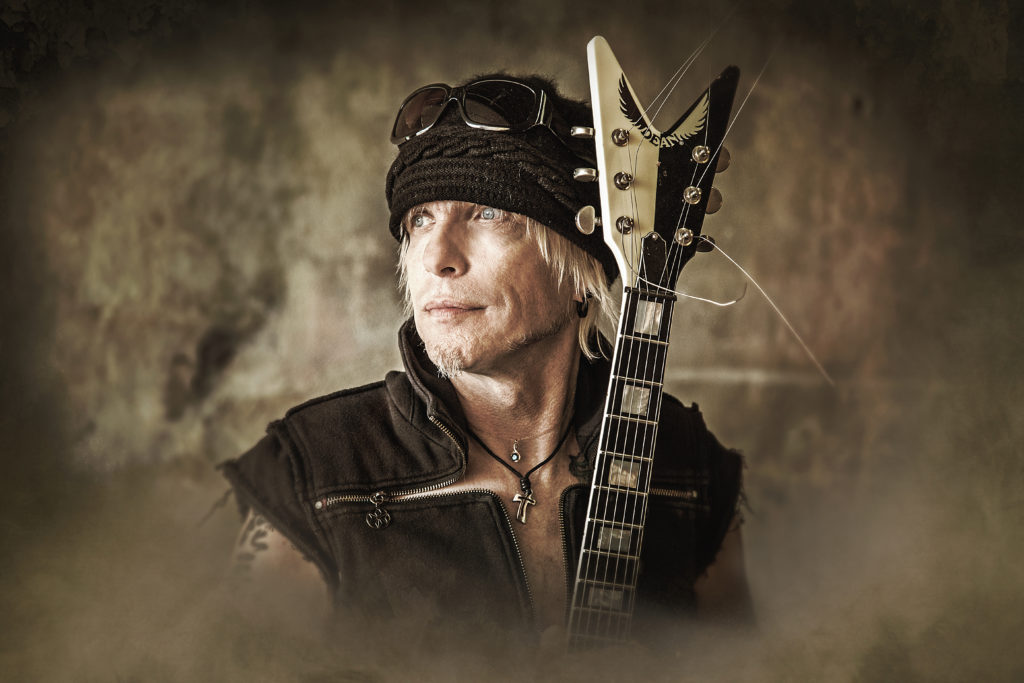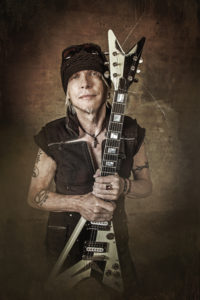
There comes a time in the life of most artists where they feel the need to sit back, reassess their goals and priorities, exorcize the negative aspects of their career journeys and refocus their creative lenses on what is truly fulfilling and meaningful.
For one of Germany’s most well-respected and prolific rock musicians/songwriters, Michael Schenker, that time away from the spotlight and the allure of fame and fortune proved to be a time of spiritual and emotional rejuvenation that saw him burst back into the spotlight a decade ago with a fresh outlook on his music. It reinforced his passion to keep performing and creating the hard-rocking, melodically memorable, and bombastically riff-reoriented brand of hard rock and metal that made him a legend and an inspiration to countless players who followed in his musical footsteps.
His current incarnation sees him fronting what is called Michael Schenker Fest, a unique presentation of his classic hits, alongside brand new material, performed with a quartet of vocalists who helped define the guitar players signature sound for more than three decades.
A mere 15 year old when he was tapped to join his brother Rudolph in his band The Scorpions, he would eventually leave that group while still in his teens to join British rockers UFO, with whom he would stay until the end of the 1970s, with a couple of reunions since.
He is likely best known for his MSG work, which began in 1980 and continued under that moniker until 2008. Through his pioneering compositions and technical virtuosity, as well as his knack for showmanship, Schenker has been cited as an influence by a veritable who’s who of rock guitarists, including; both James Hetfield and Kirk Hammett of Metallica, Megadeth’s Dave Mustaine, the late Dimebag Darrell, Mike McCreedy of Pearl Jam, Adrian Smith of Iron Maiden, Slash, Kerry King of Slayer, George Lynch (Dokken, Lynch Mob) and Phil Campbell of Motorhead, among many others.
A period of time from the mid-1990s through to the later years of the first decade of the 21st century was period of transition, contemplation and experimentation that Schenker refers to as his ‘middle years.’ It is a point in time when he deliberately stepped back from the limelight and worked through some personal demons as well as unloading all of his most esoteric creative ideas – a sort of cleaning out of the artistic attic if you will.
“Everything has been growing and expanding since I started my comeback in 2008, and it’s spreading all over the world on the same level. I purposefully stayed away from the musical machine in my middle years to experiment with my music and to be true to myself and fulfill my visions and carry on with what I call pure self-expression. So, I purposefully left the money making machine and found fulfillment within myself by being an artist and true to my heart. And that’s basically what I did in my middle years. In my first years, I had no clue what I was doing, but the middle years were when I was teaching myself to understand who I actually am. And I can do anything I want now because I have created this incredible foundation – an inner foundation – which you cannot ever buy,” Schenker explained from his home in Brighton, U.K., where he has lived for the past decade.
“It’s been half a century of self-expression and experimenting with music and being myself. I have proven that for a half a century, which is a long time, I have not been following trends, not being influenced by other people. I have been doing this professionally since I was 15 years old when I first started recording with the Scorpions. At the time, Michael Schenker’s life design was that I wanted to get a big taste of what it’s like to be famous. But then it got to be too much, and people were saying ‘Michael Schenker is a guitar God,’ and I hated that. I was really just a give having fun playing music, and I ended up being this incredible influence on so many people. After the Lovedrive [The Scorpions‘ 1979 album for which he briefly returned after leaving to join UFO in 1974] and the Live UFO album Strangers In The Night [also 1979] I knew what it was like to be up there and I didn’t need the circus. I didn’t need to be rich and famous or whatever. I just wanted to have fun with music. And that’s what I did.”
 What he did was create MSG, known as the Michael Schenker Group from 1980 through 1986, and then again from 1993 to 2010, it was also known as the McAuley Schenker Group from 1986 through 1993 from his partnership with vocalist Robin McAuley. The other MSG singers included the long-standing Gary Barden and former Rainbow/Alcatrazz frontman Graham Bonnet. Additionally, when Schenker returned to form his Temple of Rock project in 2011, he brought in another former Rainbow singer, Doogie White.
What he did was create MSG, known as the Michael Schenker Group from 1980 through 1986, and then again from 1993 to 2010, it was also known as the McAuley Schenker Group from 1986 through 1993 from his partnership with vocalist Robin McAuley. The other MSG singers included the long-standing Gary Barden and former Rainbow/Alcatrazz frontman Graham Bonnet. Additionally, when Schenker returned to form his Temple of Rock project in 2011, he brought in another former Rainbow singer, Doogie White.
Overall, there are almost too many albums with which Schenker has been associated to mention. He released three with The Scorpions, nine with UFO, 13 studio records, six live albums and on EP with various incarnations of MSG, eight solo records (during his ‘middle period) five albums with Temple of Rock.
In 2018, he released Resurrection under the banner Michael Schenker Fest. This started off as a live concert featuring Schenker reuniting with four key vocalists from his career, the aforementioned Bonnet, Barden, McAuley and White. The live DVD and CD were such a hit, and the group so much in demand that it spawned a series of tours and eventually a new studio album of all original material.
Michael Schenker Fest has continued to tour, and also managed to record a second album, which is set to be released on Aug. 23 featuring the same vocalists collaborating with Schenker. The tour is back in North America for yet another run, starting April 15 with three straight nights at the legendary Whisky A-Go-Go in West Hollywood. There will be three stops in western Canada: at the Vogue Theatre in Vancouver on April 22, and in Calgary at The Palace (formerly Flames Central) in Calgary on April 24. After through the U.S. Midwest, the tour makes one more stop in Canada at the Danforth Music Hall in Toronto on May 7, before wrapping up in Austin, Texas on May 18.
As touched upon earlier in this piece, by 2008 Schenker felt it was time to re-emerge from his self-imposed reclusiveness back into the world of hard rock and metal, especially as a touring artist. This he did with the incendiary 30th Anniversary Concert – Live in Tokyo in 2010 and the subsequent creation of the Michael Schenker’s Temple of Rock group a year later. That lasted until 2016 when the Michael Schenker Fest project began to gain so much momentum.
“In 2016 it was time for me to play the most popular music of Michael Schenker with the original singers and that’s how it started. And since then it has developed enormously. We did the live DVD and it just skyrocketed as big gigs and big tour offers started to come in. And now we have that one live DVD and two studio albums and it’s going strong,” he explained.
“The second album is basically done. The master was just sent to me and once I have had a chance to listen to it, I will give it my approval or make corrections on it. I think it’s a great album. In 2008 I had the incredible urge to be onstage again, so I took that as a sign that I was entering the third phase of my life. Since 2008 I have developed a fantastic relationship with the same co-producer, Michael Voss-Schoen, and he has helped me so much to achieve my vision.”
For the as-yet-untitled new Michael Schenker Fest album, the guitarist said some of the vocalists, particularly Bonnet, wanted to contribute more writing to the album, while all of them “were just fantastic.”
The only downer came with the sudden death of drummer Ted McKenna in January of this year. In his place, Schenker recruited two former MSG skin-bashers to split the remaining recording sessions and live shows in McKenna’s absence. One is long-time session drummer and former touring drummer for The Who, Jeff Beck and Toto (among many others) Simon Phillips (who played on the first MSG record), the other is Italian drummer Bodo Schopf, another lauded and veteran session player/sideman, who played on two MSG albums – 1987’s Perfect Timing and it’s follow up, Save Yourself, which was released in 1989.
Phillips played the bulk of the parts on the new album, while Schopf has been tagged to be the sole drummer for the upcoming North American tour, as Phillips has other commitments, although Schenker did not rule out the possibility of the odd show featuring both drummers or using both for subsequent tours once the next album is released.
“They both worked together to figure out the parts because with the sudden death of Ted in the middle of recording and getting ready for the tour, it amped up the pressure. Both are such amazing drummers that they were able to decide who was going to do what, so Simon was putting his drum parts down on 10 songs for the album, while Bodo, Chris Glen [bass], [rhythm guitarist] Steve Mann and I were rehearsing our butts off here in Brighton for the tour. But we are ready to rock,” he said.
 “It was some kind of shock when Ted McKenna passed away. You never know what’s going to happen next in life, but you have to keep going and have to accept the things that happen, even though you don’t know why they happen or when they might happen. It’s a part of life, but I know that Ted is still with us, absolutely – know he is watching us.”
“It was some kind of shock when Ted McKenna passed away. You never know what’s going to happen next in life, but you have to keep going and have to accept the things that happen, even though you don’t know why they happen or when they might happen. It’s a part of life, but I know that Ted is still with us, absolutely – know he is watching us.”
There is a joy in Schenker’s voice when he talks about writing, recording and especially playing live, a joy that is palpable and evident in both the compositions on the Resurrection album, as well as the playing on the record. All the backing musicians and vocalists stepped up their game, creating an album that is both a nod to their collective past with Schenker, but with a forward thinking attitude and emotional intensity that bodes well for the next album and beyond.
It is a sign of an artist who, 50 years into his masterful and prodigious career, has the same energy and excitement that he did when drafted by big brother Rudolph into the Scorpions at age 15.
“As a person and as an artist you have to consciously understand who you are, you know. And I think the middle years did that for me. My life design is a very peculiar one, but I can see it very clearly and that’s important. I did it very consciously and now I can make up for what I put on hold in my middle years. While everybody was gobbling around for money and fame, I just did my little bit of music. So, now that I am able to stay true to myself, I can do anything now,” Schenker said.
“I got everything out of my system; there is nothing left that I haven’t done that I wanted to do. And I don’t think I could have got to this place if I had joined Ozzy [he was recruited to possibly replace Randy Rhoads] or stayed with the Scorpions or stayed with UFO. Now, because of being consistent with my vision, I am now at the point where, as I said, I can do anything. I have basically built a house on solid rock; I have the solid foundation within myself to fulfill that vision. Everything else is just icing on the cake.”
For more information on Michael Schenker Fest’s tour, and forthcoming album visit http://www.michaelschenkerhimself.com.
- Jim Barber is a veteran award-winning journalist and author based in Napanee, ON, who has been writing about music and musicians for a quarter of a century. Besides his journalistic endeavours, he now works as a communications and marketing specialist. Contact him at jimbarberwritingservices@gmail.com.
SHARE THIS POST:
